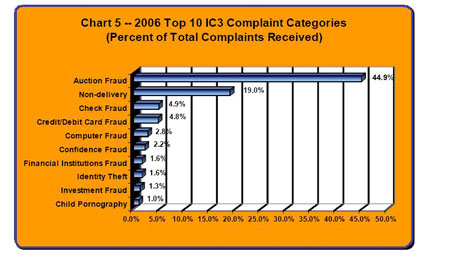Difference between revisions of "Internet Crime"
(added statutes) |
(→Criminal States Governing the Internet: addition of cite) |
||
| Line 5: | Line 5: | ||
*18 USC § 1030, prohibits destructive activity | *18 USC § 1030, prohibits destructive activity | ||
| + | *18 USC § 1030(a)(5)(A) Knowingly transmitting a program, script, or code that would cause damage to a protected computer | ||
*18 USC § 1343, prohibits wire fraud | *18 USC § 1343, prohibits wire fraud | ||
Revision as of 20:55, July 13, 2007
Internet Crime are a group of online related crimes, most of them particular or unique to the Internet. Some of them are variations on older schemes of a non-Internet nature, adapted for use on the Net.
Contents
Criminal States Governing the Internet
- 18 USC § 1030, prohibits destructive activity
- 18 USC § 1030(a)(5)(A) Knowingly transmitting a program, script, or code that would cause damage to a protected computer
- 18 USC § 1343, prohibits wire fraud
- 18 USC § 1361-2, prohibits malicious mischief
- 18 USC § 2314, prohibits interstate transport of improperly obtained materials[1]
- 18 USC § 2510-11, prohibits interception of electronic communications
- 18 USC § 2701, prohibits access to information stored on a computer
Computer Crime & Intellectual Property Section United States Department of Justice
Reporting Computer Hacking, Fraud and Other Internet-Related Crime:
The primary federal law enforcement agencies that investigate domestic crime on the Internet include: the Federal Bureau of Investigation (FBI), the United States Secret Service, the United States Immigration and Customs Enforcement (ICE) , the United States Postal Inspection Service, and the Bureau of Alcohol, Tobacco and Firearms (ATF) . Each of these agencies has offices conveniently located in every state to which crimes may be reported. Contact information regarding these local offices may be found in local telephone directories. In general, federal crime may be reported to the local office of an appropriate law enforcement agency by a telephone call and by requesting the "Duty Complaint Agent."
Each law enforcement agency also has a headquarters (HQ) in Washington, D.C., which has agents who specialize in particular areas. For example, the FBI and the U.S. Secret Service both have headquarters-based specialists in computer intrusion (i.e., computer hacker) cases. [2]
The Internet Crime Complaint Center
The Internet Crime Complaint Center (IC3) was established as a partnership between the Federal Bureau of Investigation (FBI) and the National White Collar Crime Center (NW3C) to serve as a means to receive Internet related criminal complaints and to further research, develop, and refer the criminal complaints to federal, state, local, or international law enforcement and/or regulatory agencies for any investigation they deem to be appropriate. The IC3 was intended, and continues to emphasize, serving the broader law enforcement community to include federal, as well as state, local, and international agencies, which are combating Internet crime and, in many cases, participating in Cyber Crime Task Forces.
Since its inception, the IC3 has received complaints crossing the spectrum of cyber crime matters, to include online fraud in its many forms including Intellectual Property Rights (IPR) matters, Computer Intrusions (hacking), Economic Espionage (Theft of Trade Secrets), Online Extortion, International Money Laundering, Identity Theft, and a growing list of Internet facilitated crimes. Since June 2000, it has become increasingly evident that, regardless of the label placed on a cyber crime matter, the potential for it to overlap with another referred matter is substantial. Therefore, the IC3, formerly known as the Internet Fraud Complaint Center (IFCC), was renamed in October 2003 to better reflect the broad character of such matters having an Internet, or cyber, nexus referred to the IC3, and to minimize the need for one to distinguish "Internet Fraud" from other potentially overlapping cyber crimes.
IC3 Mission Statement
- IC3's mission is to serve as a vehicle to receive, develop, and refer criminal complaints regarding the rapidly expanding arena of cyber crime. The IC3 gives the victims of cyber crime a convenient and easy-to-use reporting mechanism that alerts authorities of suspected criminal or civil violations. For law enforcement and regulatory agencies at the federal, state, local, and international level, IC3 provides a central referral mechanism for complaints involving Internet related crimes.
- Significant and supplemental to partnering with law enforcement and regulatory agencies, it will remain a priority objective of the IC3 to establish effective alliances with industry. Such alliances will enable the IC3 to leverage both intelligence and subject matter expert resources, pivotal in identifying and in crafting an aggressive, proactive approach to combating cyber crime. [3]
References
- ↑ This applies to computer data files U.S. v. Riggs, 739 F.Supp. 414 (N.D.Ill 1990).
- ↑ http://www.usdoj.gov/criminal/cybercrime/reporting.htm
- ↑ http://www.ic3.gov/about/
